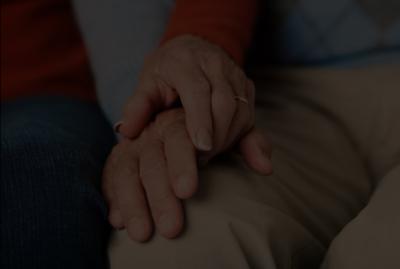Losing Your Spouse, Losing the Present
How can one possibly absorb the shock of the death of a mate? No matter how many years you have shared, memories of courtship, lifelong plans, and your marriage are most difficult to bear. Not to mention what has been left behind: children and grandchildren; dreams yet to be
fulfilled. These memories are part of your past and the death of your spouse is something you must deal with today. The thought of which is painful at the very least.
Reactions to Death
If your spouse has died, you will probably experience some of the common symptoms of grief. You will very likely go into shock and denial. You may experience feelings similar to what an amputee goes through, where they actually "feel" pain in the missing limb. In the case of a lost loved one, you’ll “see” them sitting in their favorite chair or coming through the front door. This "phantom" pain may manifest itself in hearing their
voice calling from another room. Their cologne or perfume lingers in closets and throughout the home you shared, evoking powerful feelings.
You may feel "numb," like a spectator watching events unfold. This is nature’s way of protecting you from what is happening while your life is in transition.
You may also find yourself filled with anger. You may feel angry at the doctors or nurses who couldn’t save your spouse, or maybe even with God. You may feel anger toward your spouse for leaving you, and then feel guilty for this anger.
In fact, guilt can be one of the toughest feelings to overcome in your grief recovery. It is common, in transition, to feel guilty simply for being alive when someone else has died. You may believe you somehow could have prevented the death, or should have been present to say good-bye.
Because relationships are never perfect, you undoubtedly had unresolved issues at the time of death. These can be very difficult to overcome,
and many choose to seek counseling to help bring about closure.
Powerful reactions to grief are most often unexpected by the bereaved. The effects are physical as well as mental. The feeling of being alone causes your mind to race. You cannot sleep. You cannot think clearly. Your muscles are tense and your body aches.
It is not unusual to experience nausea, dizziness, rashes, weight loss, in addition to difficulty in sleeping. You may become irritable or listless, feel fatigued, or short of breath. Grief has even been known to cause hair loss.
As the Shock Wears Off
The acceptance of your spouse’s death will slowly become a reality. You may think "My life will never be the same again." "I cannot change what has happened to me." "Oh God, what am I going to do now?" A course of grief recovery depends partly on your age and mostly on your individual situation.
A surviving spouse from a younger, two-income family may end up in a tight financial situation; not to mention any children to consider, as the
transition to a single-parent household is made.
Profound loneliness occurs when future plans include having children and the opportunity is lost by the death of a spouse. This is especially true if the bereaved feels a child would have been a living part of the mate who died.
"Empty-nesters" feel the effects of a spouse’s death in other ways. The fact that the house is completely empty now, precipitates an entirely different level of loneliness. This is especially true in marriages that have lasted many years, where plans for a long and enjoyable retirement were disrupted by a spouse’s death.
Losing your life companion can leave you feeling confused and panicky at any age. For this reason, you should delay making any major decisions. Try to postpone them until you can think more clearly and have a better idea of how your life is going to change. Antoine de Saint-Exup’ery wrote, "... you cannot plant an acorn in the morning and expect that afternoon to sit in the shade of the oak."
You have grown accustomed to living a certain life-style and engaging in favorite activities with your spouse. You are used to being the object of your spouse’s love. For example, a woman who becomes a widow didn’t just lose her husband. She lost her best friend, her confidant, her "knight in shining armor."
The death of your spouse can also change the relationship you had with mutual friends. Those same friends you socialized with as a couple, may have a difficult time interacting with you as an individual. You may begin to feel like the "fifth wheel." Life without your spouse may steer you in the direction of a new circle of friends. Many times, lasting friendships develop between people who met in grief support groups. Your loss is a common bond.
Coping
How can you overcome the problems you face after your spouse has died? First, you must recognize that grief is necessary; it is something you must work through. There are no shortcuts.
It is important to express your feelings. Take time to cry. Don’t be afraid to share your tears with others. Express your anger when you feel the
need. Talk openly with family members and friends; this is a time to lean on them. Some of your friends may feel awkward for awhile because they don’t know how to talk to you about your loss. You can help them by simply telling them what your needs are. Don’t try to protect your children or other family members by hiding your sadness.
If you normally have a pressing schedule, try to lighten it. Remember, grief is mentally taxing; you do not need the added strain of too much to do.
Set aside some quiet time for yourself, time when you can think about your spouse’s death and put things into perspective.
If you are worried that you are not coping well with your grief, consider talking to a counselor. You may be relieved to discover that you are reacting normally. If you believe you need help, ask your clergy, doctor, or funeral director to suggest a counselor who will help you through your transition.
Many bereaved spouses find adjusting to life without a partner becomes easier if they talk to others in the same situation. You might want to consider joining a local support group. Ask us for information regarding local groups specifically for those who have lost a spouse.
After some time and effort, you will adjust to your new life and your grief will diminish. This does not mean you must forget your loved one; it means you have accepted the death and can begin to live each day in the present, savoring the memories as part of your new life. In fact, many agree the best way to honor a loved one who died, is to live a life full of friendship and even new
love.
Dealing properly with your grief can make it all possible.




